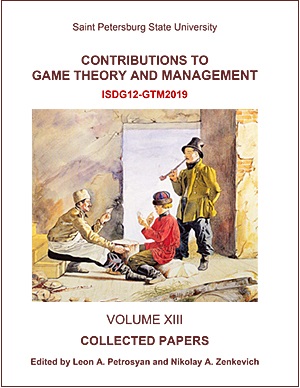Looking Forward Approach with Random Horizon in Cooperative Differential Games
DOI:
https://doi.org/10.21638/11701/spbu31.2020.20Abstract
In the paper authors present a new approach to determination and computation of a solution for differential games with prescribed duration in the case when players lack certain information about the dynamical system and payoff function on the whole time interval on which the game is played. At each time instant players receive information about dynamical system and payoff functions, however the duration of the period of this information is unknown and can be represented as a random variable with known parameters. At certain periods of time the information is updated. A novel solution is described as a combination of imputation sets in the truncated subgames that are analyzed using Looking Forward Approach with random horizon. A resource extraction game serves as an illustration in order to compare a cooperative trajectory, imputations, and imputation distribution procedure in the game with Looking Forward Approach and in the original game with prescribed duration. Looking Forward Approach is used for constructing game theoretical models and defining solutions for conflict-controlled processes where information about the process updates dynamically.
Keywords:
differential games, time-consistency, predictive control
Downloads
References
Downloads
Published
How to Cite
Issue
Section
License
Articles of "Contributions to Game Theory and Management" are open access distributed under the terms of the License Agreement with Saint Petersburg State University, which permits to the authors unrestricted distribution and self-archiving free of charge.




